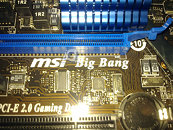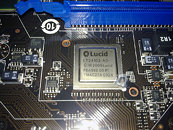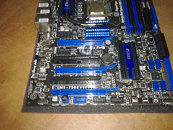- Joined
- Oct 9, 2007
- Messages
- 47,233 (7.55/day)
- Location
- Hyderabad, India
| System Name | RBMK-1000 |
|---|---|
| Processor | AMD Ryzen 7 5700G |
| Motherboard | ASUS ROG Strix B450-E Gaming |
| Cooling | DeepCool Gammax L240 V2 |
| Memory | 2x 8GB G.Skill Sniper X |
| Video Card(s) | Palit GeForce RTX 2080 SUPER GameRock |
| Storage | Western Digital Black NVMe 512GB |
| Display(s) | BenQ 1440p 60 Hz 27-inch |
| Case | Corsair Carbide 100R |
| Audio Device(s) | ASUS SupremeFX S1220A |
| Power Supply | Cooler Master MWE Gold 650W |
| Mouse | ASUS ROG Strix Impact |
| Keyboard | Gamdias Hermes E2 |
| Software | Windows 11 Pro |
MSI already has its task cut out when Intel's first socket LGA-1156 processors hit stores. With entry-level P55-CD53, mid-range P55-GD65, enthusiast-range P55-GD80, and a micro-ATX P55M-GD45 motherboard offering in place, the lineup seems just about complete, except for two mysterious motherboards that aren't part of the list. First being the G9P55-DC that packs an NVIDIA BR-03 bridge chip that enables 3-way SLI with better interface bandwidth to the three graphics cards, and second is under the looking-glass today. Codenamed "Big Bang", this prototype motherboard by MSI packs a LucidLogix Hydra technology, which clearly on paper, is the next big thing as far as multi-GPU systems go.
MSI P55 "Big Bang" looks similar to the P55-GD80, except for that under the top chipset heatsink (which, by the way, is purely cosmetic on the GD80), is a Lucid Hydra chip. The chip connects to all three (or four) PCI-Express x16 slots (lane configuration not known), and allows Lucid's multi-GPU technology that lets you make practically any combination of graphics cards, for performance scaling. The member cards needn't have parity on their performance, as the Hydra chip does all the load-balancing by itself. Products based on Hydra are slowly, but surely showing up in small numbers for now, including enterprise-grade rack-mount graphics rendering boxes like this one, conceived a long time ago. A lot of details are yet to emerge, especially around if there are more motherboard manufacturers eying Hydra, about when a Hydra-based product actually makes it to shelves, and more importantly, when does MSI plan to sell this and G9P55-DC.



View at TechPowerUp Main Site
MSI P55 "Big Bang" looks similar to the P55-GD80, except for that under the top chipset heatsink (which, by the way, is purely cosmetic on the GD80), is a Lucid Hydra chip. The chip connects to all three (or four) PCI-Express x16 slots (lane configuration not known), and allows Lucid's multi-GPU technology that lets you make practically any combination of graphics cards, for performance scaling. The member cards needn't have parity on their performance, as the Hydra chip does all the load-balancing by itself. Products based on Hydra are slowly, but surely showing up in small numbers for now, including enterprise-grade rack-mount graphics rendering boxes like this one, conceived a long time ago. A lot of details are yet to emerge, especially around if there are more motherboard manufacturers eying Hydra, about when a Hydra-based product actually makes it to shelves, and more importantly, when does MSI plan to sell this and G9P55-DC.



View at TechPowerUp Main Site
Last edited:







